Production Engineering
Developing tools and jigs to increase productivity
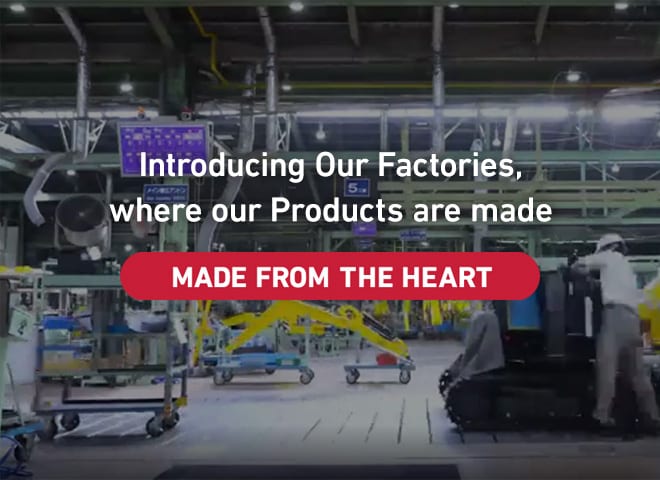
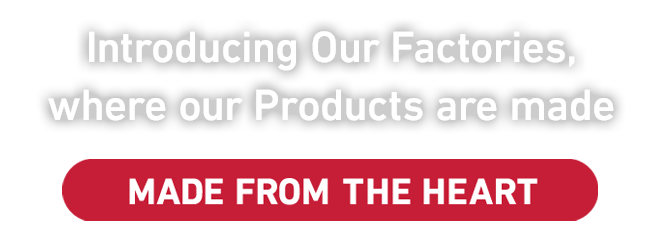
Yanmar compact construction equipment gives you maximum performance in urban development projects.
Cities are cramped, complex spaces, so whichever way you look at it, you're going to need better quality equipment, equipment with better power,
better maneuverability, better fuel efficiency, better environmental credentials, and better durability.
It's the capabilities of our people and their hearts, tenaciously committed to developing and making better quality equipment that delivers that quality.
Japan
Yanmar Construction Equipment
France
Yanmar Construction Equipment Europe
Germany
Yanmar Compact Germany
Our motto is: Safety, high quality,and high efficiency.
Our job is to design and develop superior tools and jigs for superior production.
We ask workers on the front lines what problems they are having, then design and develop the tools and jigs to meet the plant's production needs. As a department which is directly tied to improving productivity, we have taken the lead in designing and refining production processes with the aim of ensuring efficient and safe manufacturing regardless of who is engaged in the task.

I'm in charge of the painting process. In one case I worked on there was a defect which was due to a thread of clothing getting caught on a part. I investigated the cause and this led to stricter rules for the clothing we wear while working. Even small things can lead to better productivity, so I will not only visit the front lines myself, but also flexibly respond to calls from the front lines to deal with something unexpected.
Yuya Sakaguchi
Production Engineering Section, Production Engineering Department
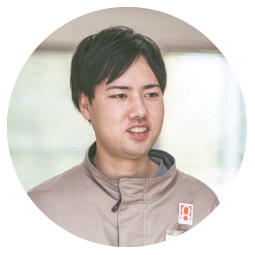
When I first joined the company I couldn't even understand the drawings, but now that I'm in my third year I've managed to gain a good level of expertise. That's thanks to the consistent follow-up of my senior co-workers. Visiting the Yanmar Group's production plants for agricultural equipment and other machines stimulated new ideas and ways of thinking. I get my motivation from coming up with plans and ideas for technologies that will make the people on the front lines happy, while cooperating with people inside the plant and with other groups.
Takuma Harada
Production Engineering Section, Production Engineering Department
We thoroughly inspect the parts being introduced, to ensure the highest level of quality for mass production.
We inspect all areas including the measurements, strength, and the exterior of all new parts in detail, to ensure they meet the requirements of the design drawings. Our inspections are extremely strict, checking for contamination with microscopes and confirming the dimensions with 3D measuring instruments. A single part can affect the productivity of the whole plant, so we work to maintain accuracy with repeat inspections if we find something wrong.

When I was first assigned here I had to learn to read the drawings and understand how to use the different measuring instruments for each part. It was a trying time, but my senior co-workers always made sure I understood what I was learning and devoted themselves to making sure I could do the measurements by myself. If we make a mistake then we let defective parts go into the production process, so we're always constantly on the alert in our inspections. There's always a feeling of a job well done when all the parts, big and small, come together to form a single product.
Shogo Nakagawa
Parts Inspection Team, Quality Control Section, Quality Control Department
There are over 2,000 kinds of parts handled in this area. For each product, the right set of parts is sent to the right manufacturing process.
The number of parts required for a single machine is around 400. The parts required for each process are sorted into sets and supplied to each line. Parts management was partially systematized from 2015 to make the supply of parts more efficient.
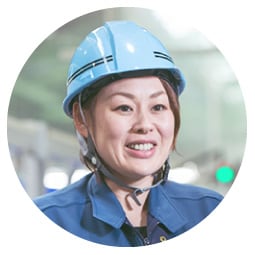
The reason I joined this company was because I heard that I could be involved in setting up processes that had not yet been incorporated into picking. When the picking system was introduced in 2015, I was involved in its creation from the selection of the system to considering maintenance of the menu display and the layout of the shelves. Currently, I am in control of the entire work process, and am engaged in making further improvements including productivity optimization. I am constantly striving to ensure that there are no faulty or defective products so that production goes smoothly.
Ayumi Yamaguchi
Chikugo Office, Seisin-Competence-Support
We utilize presses of up to 1,000-tons together with 3D lasers. We produce parts of all shapes and sizes here.
This process turns steel plates into parts. Massive presses up to 1,000 tons and 3D lasers are used to fabricate all sorts of parts, from those weighing 130 kilograms, to ones small enough to fit in the palm of your hand. We utilize Yanmar Construction Equipment's proprietary pressing technology to form 1.6 millimeter steel plates into deep concave shapes, like that of a saucepan.
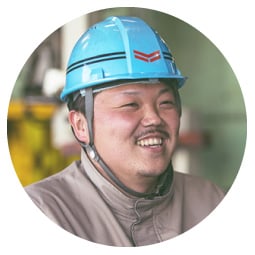
How the final part looks in presswork is a key factor, such as whether there are scratches or the cleanness of the laser cutting edges. In particular, the appearance of a part is something that each person has a sense of and can judge for themselves. My own sense of what is good may be different from that of other workers, inspectors, or customers, so, for parts that are hard to judge, we produce a sample to serve as a quality standard, and share it throughout the workplace. In the city, I often see construction machinery that I have actually helped to complete, and because I know which parts I was involved with, I don't make any compromises in my work.
Nobuhisa Harashima
Machining Group 2, Seirei Total Service
What we look for is a beautiful and airtight finish. We handle parts like covers or fuel tanks that are up to 4.5 millimeters thick.
We weld thin steel plates from 2.3 to 4.5 millimeters thick. Generally, we handle parts that require exterior quality, like covers, or parts that need to be airtight, like hydraulic fluid tanks. We try to ensure top quality by conducting submerged water visual inspections, which use air pressure to check for any leaks, and machine wash parts to remove dirt that is invisible to the naked eye.

Thin welding pieces are prone to warping and require surface polishing techniques after the welding, but at the same time, I feel a great sense of achievement when I see the actual machine ready to be shipped. One of the special things about working at Yanmar Construction Equipment is the number of opportunities there are to get advice from various departments on the work I am in charge of. Our products are shipped worldwide, and because of this I work with a sense of enjoyment and always want to make our products better.
Shota Kakihara
Machining Group 2, Seirei Total Service
Welding heavy parts up to 50 millimeters thick that require strength. Humans and robots work together to ensure precision.
We weld thick steel plates from 4.5 to 50 millimeters thick. I work the rotating drive parts, which are essential elements of construction machinery. Robots handle tack welding, while humans weld the detailed areas. Welding requires a high level of skill, and therefore proficiency examinations are held twice a year in the workplace to further improve our technique.
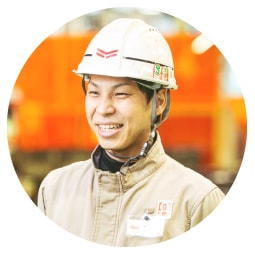
Welding is much more than just joining two steel plates together. It requires the skills to maintain the balance between making it look good and ensuring adequate strength. Now that I'm in charge of teaching the new workers as a section leader, I can see how hard it is to pass down the skills I was taught. Teaching others makes you grow yourself and I hope that with my co-workers, we can improve and build up our knowledge together.
Tatsuya Tsumura
Welding Section, Manufacturing Department
Singlehandedly performing the entire process, from mixing and preparing the paint to finishing the fine details.
The task is to make the exterior of the machine - its "face" - look as good as possible.
100 to 170 parts per machine are sorted into three lines by drying temperature: high, normal, and low. Mixing paint for rustproofing and painting the fine areas that machines cannot handle is all done by hand. As a process that affects the exterior quality of the product, it requires a great deal of skill to cover the entire surface evenly with a coat only 0.06 mm thick.

The final finish of the paint is affected by the temperature and humidity inside the plant and by time, so we have to change the paint compounds depending on the situation. As the section leader, I give orders to the staff in the various processes on the painting line, and make adjustments so that the paint passes the set standards. Since 2016 we have also had additional dedicated inspectors working with us. I can certainly see an improvement in quality by emphasizing the importance of communication between the workers and the inspectors, so that we all cooperate together.
Taichi Tanaka
Painting Section, Manufacturing Department
Assembling all the backhoes to be manufactured on a single line, from 0.5t to 10t.
An elite team of workers combine inspiration and technology to assemble the backhoes.
Currently, there are 16 models in the backhoe product line. The specifications are different, for the countries where they will be used, and as requested by customers, so in fact there are over 200 different patterns. The assembly of all of these on a single line is one of the unique features of Yanmar Construction Equipment. Each process takes around 7 minutes, passing on the machine to the next process without any delays.
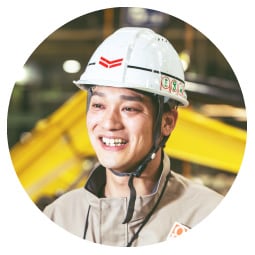
A line assembling multiple types of machines requires a vast amount of knowledge and a high degree of technological capability compared to a line manufacturing just one model. That's why each of us has a strong sense of professionalism, making sure that every single bolt is tight. As the section leader, I give orders to my staff and manage the assembly, and I feel pride in working in a job that other plants cannot do and in helping to build Yanmar quality.
Kazuki Minamijima
Assembly Section 1, Manufacturing Department
Manufacturing 1t and 5t machines on a single line. Employees fully focused on quality work together to complete the machinery.
Painted parts, purchased parts, and other parts are sorted into eight processes for assembly to complete the loaders and carriers. In order to improve our production efficiency, we introduced a conveyor line in 2016. There are fewer parts compared to backhoes, so while the number of employees is smaller, each member of this elite team plays a pivotal role with many responsibilities keeping them on their toes as they work.
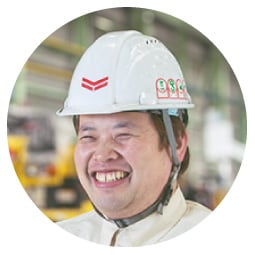
My job is process monitoring, and I inspect the assembled machines. It's certainly strict, but the fact that my job is directly connected to maintaining the trust of our customers gives me a real sense of motivation. Yanmar Construction Equipment provides full support for training courses and for gaining qualifications, so there are lots of opportunities to absorb the necessary knowledge to detect and fix defects. The fact that I can develop my own skills while working on the job definitely helps motivate me.
Takahisa Atsuta
Assembly Section 2, Manufacturing Department
We need knowledge of all the processes and models. In order to satisfy our customers, absolutely no compromise is allowed.
In this process, we inspect the exterior and the functioning of the assembled machines. We check every single point, from scratches in the paint, to the tightness of the bolts, mistakes in assembly, or oil leaks. We make sure to actually operate the machines just as they will be used in real life.

When I first joined the company, I was overwhelmed by the diversity of models and specifications to be inspected, as well as the vast scope of the inspection methods. It really tests your knowledge of each process and each model, so you feel exhilarated when you find a defect and accurately ascertain the cause. But the ultimate goal of shipping inspections is to give feedback to those who manufactured the machine to ensure that the same mistake never occurs twice. To reach that goal, I will continue to hone my skills while cooperating with the people in the other processes, to further increase our precision.
Takaya Baba
Shipping Inspection Section, Quality Control Department

● Learning the fundamentals of safety and quality in both theory and hands-on training.

Every employee, whether a new graduate or a mid-career recruit, learns the Fundamentals of Manufacturing that have been passed on at Yanmar Construction Equipment at our Training Center. The three-day curriculum includes lectures, practical training, and hands-on experience. The lectures impart knowledge, while the practical training simulates actual working conditions. The hands-on experience utilizes equipment on which accidents have actually occurred in the past, to make sure that trainees become aware of the dangers, to avert any major risks and to improve their techniques.
Senior workers give direct instructions on everything from the correct working posture to the strength and speed used to tighten a single bolt.
● Building Production Systems to Get the Best Results on the Front-Lines

The Production Control Department is in charge of constantly maintaining the production system in close contact with the front-lines, and acting as the control tower for running the plant. Our job is to come up with the optimum plans to match the personnel allocation inside the plant, the ordering of parts, supply lines, production schedules, and so on, so that all employees can give their maximum performance.

The required tasks are completely different for each process, but we have to constantly confirm whether the set man-hours in each workplace are suitable and whether the tasks the front-line employees have to do are too difficult. To do this, we make video recordings of all the tasks and analyze each person's actions, with the aim of creating a workplace in which people will find it easy to work.
Toshihiro Tsutsumi
Production Control Section, Production Control Department
Currently 25% of our parts are procured from outside Japan. We are bringing low-cost, high-quality parts into the workplace, while building up our experience in doing business outside Japan. Even as we globalize, we want to absorb ideas from the front lines, from salespeople, and many others, so that we can build even better production systems.
Takashi Hashimoto
Procurement Section, Production Control Department
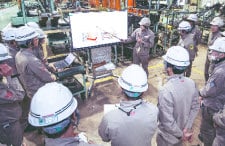
Our KAIZEN (improvement) contest, held since 1982, shares the ideas and successes achieved by employees in each process to shorten times and improve quality. Every precious minute or second we save in each task makes for more efficient, safer, and higher-quality manufacturing. This concept is alive throughout the entire plant. This contest is just one example of how we embody that in our work.
